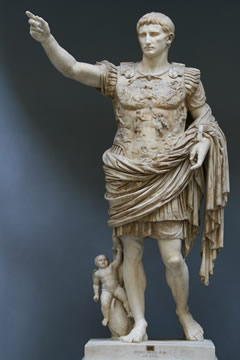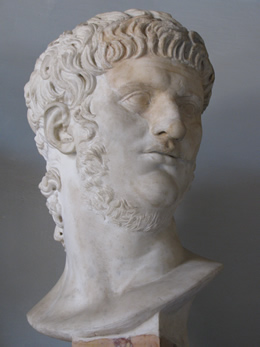From Our Archives
Debie Thomas, Knowing and Being Known (2014); and Debie Thomas, What Belongs to God (2020).
For Sunday October 22, 2023
Lectionary Readings (Revised Common Lectionary, Year A)
Exodus 33:12-23 or Isaiah 45:1-7
Psalm 99 or 96:1-13
1 Thessalonians 1:1-10
Matthew 22:15-22
This Week's Essay
Title: Should We Pay Taxes?
A few years ago I sold a coin collection to a dealer who specializes in coins from antiquity, especially those from the Greek and Roman periods. In the store's glass cases were numerous coins from the Roman emperors who reigned during the days of Jesus and the early believers — Augustus, Tiberius, Caligula, Claudius, and Nero. With over 4,000 coins in his inventory, I like to imagine that some of them circulated among Jesus and his friends.
The different coins were identical in one respect. In a graphic display of political hubris and economic might, every one of them bore the image of their emperor. The coins reminded me that the stories of Jesus are not ethereal platitudes. Rather, the gospel describes confrontations that were embedded in a concrete time and place. In Matthew 22 for this week, Jesus tells a story about taxes, and then illustrates it with a coin from the emperor Tiberius. In doing so, he challenges three major idolatries of both his day and ours: money, the state, and religion.
Just like us today, the Jews of Jesus's day were saddled with onerous taxes. In Matthew 17 we read about a Temple tax. They also paid custom taxes, and taxes on land. In Matthew 22 a controversy arose about yet another tax, an annual tribute tax paid to Rome: "Is it right to pay taxes to Caesar or not?" (Matthew 22:17). Why should poor peasants in Israel send their hard-earned money all the way back to Rome, 1400 miles away, and to its powerful emperor?
 |
|
Augustus (d. 14 AD), January 16, 27 BC – August 19, 14 AD.
|
The Jews of that day disagreed about how to answer this question. Those whom we might call "realists" collaborated and cooperated with Rome and paid the tax. Maybe they did it out of conscience, or maybe as a survival strategy. Who wanted undue attention from the iron fist of Rome? Don't rock the boat, let well enough alone. On the other hand, the "idealists" of a more nationalistic bent resented and protested Roman economic exploitation out of principle (think of the 17th century Quakers). They might have resisted paying that tax to Rome.
The Pharisees who despised Rome and the Herodians who cooperated with Rome (as their name implies), were opposing sects, but in this story the enemies join forces. It's no surprise that what they really wanted was not an honest answer to a complicated question, but rather, as the gospel says, "to trap Jesus in his words."
That seemed easy enough. If Jesus agreed that the Jews should pay taxes to caesar, that sounded like capitulation to the oppressive Romans and a renunciation of Jewish nationalism. He would have lost his audience. But to answer in the negative and encourage tax evasion was political sedition that would have jeopardized his ministry and endangered anyone who followed him.
In fact, telling people not to pay their taxes to Rome was one of the charges that led to Jesus's criminal execution: "This man opposes paying taxes to caesar and claims to be Christ, a king" (Luke 23:2). That was an incendiary rumor, perhaps the ancient equivalent of our "fake news," but it had some legitimacy because of Jesus's many subversions of money, politics and power.
 |
|
Tiberius (d. 37 AD), September 18, 14 AD – March 16, 37 AD.
|
A few decades after Jesus, one of the principal criticisms against the early Christians was that they were "atheists," or unreliable citizens, because they refused to bow down to caesar, to participate in the cult of imperial worship, that they made the subversive counter-confession "Jesus is Lord" (= caesar is not lord), and practiced what eventually was branded an illegal (= non-state) religion. The simplest Christian confession was fraught with economic and political implications.
The trick question of the Pharisees and Herodians, who joined forces to trap Jesus, elicited a trick answer from Jesus. He asked them for the coin that was used to pay the state tax, and then asked whose image it bore. Most likely the coin in question bore the image of the emperor Tiberius who ruled Rome during those years (AD 14–37). One side of the coin would have deified Tiberius as a "son of the divine Augustus." The other side would have honored him as the "Pontifex Maximus" or "chief priest" of Roman polytheism—which is to say that the two sides of the coin celebrated the absolute religious and civil authority of Tiberius.
To a nationalistic Jew who confessed a radical monotheism, such a graven image was religiously offensive and politically humiliating. Certainly some of the crowd would have been repulsed at the political, religious, and economic implications of honoring a pagan "god" by paying a tax to him. What should a conscientious Jew do? How would Jesus respond to this lose-lose proposition?
When Jesus's questioners said that the coin bore the image of caesar, he replied with an enigmatic answer: "Give to caesar what is caesar's, and to God what is God's." Rather than making an inflammatory political statement by denouncing Rome, maybe Jesus sought to evade their trap with a dismissive shrug — "If the coin belongs to caesar, let him have it. So what? It's merely money." In this scenario Jesus refused to take their bait. We might even imagine Jesus taunting his questioners by pocketing the coin.
But what about the second half of his answer? What do we owe to God? Merely a temple or state tax, or everything, which is far more than money? I like the conclusion of New Testament scholar Marcus Borg:
Thus this text offers little or no guidance for tax season. It neither claims taxation is legitimate nor gives aid to anti-tax activists. It neither counsels universal acceptance of political authority nor its reverse. But it does raise the provocative and still relevant question: What belongs to God, and what belongs to Caesar? And what if Caesar is Hitler, or apartheid, or communism, or global capitalism? What is to be the attitude of Christians toward domination systems, whether ancient or modern?
 |
|
Nero (d. 68 AD), October 13, 54 AD – June 11, 68 AD.
|
At issue is not merely my economic relationship to the government, but my existential relationship with God. On that ancient coin was an image of caesar, and merely money is owed to him. On the other hand, and far more importantly, every human being bears the image of God, implying that I "render to God" wholly and without condition my entire self. So, pay your taxes to caesar, and give your whole self to God.
Paying taxes is the simple part. However distasteful, you hold your nose and write a check. Rendering relative honor to that subordinate caesar is similarly easy, and perhaps even necessary. As a friend of mine observed, civilization is expensive, and taxes pay the tab. But absolute allegiance to an ultimate God, rendering our entire selves to Him without preconditions or limits, without hedging our bets, is a higher and harder calling. That takes a lifetime.
NOTE: Marcus Borg, "What Belongs to God?" at http://www.beliefnet.com/story/20/story_2000_1.html.
Weekly Prayer
The Covenant Prayer of John Wesley (1703–1791)
I am no longer my own, but thine.
Put me to what thou wilt, rank me with whom thou wilt.
Put me to doing, put me to suffering.
Let me be employed for thee or laid aside for thee,
exalted for thee or brought low for thee.
Let me be full, let me be empty.
Let me have all things, let me have nothing.
I freely and heartily yield all things to thy pleasure and disposal.
And now, O glorious and blessed God, Father, Son and Holy Spirit,
thou art mine, and I am thine.
So be it.
And the covenant which I have made on earth,
let it be ratified in heaven.
Amen.From Adam Hamilton, Seeing Gray in a World of Black and White (Nashville: Abingdon, 2008), page 232. In his footnote to this prayer Hamilton directs readers to The United Methodist Hymnal (Nashville: The United Methodist Publishing House, 1989), p. 607.
Dan Clendenin: dan@journeywithjesus.net
Image credits: Wikipedia.org.





